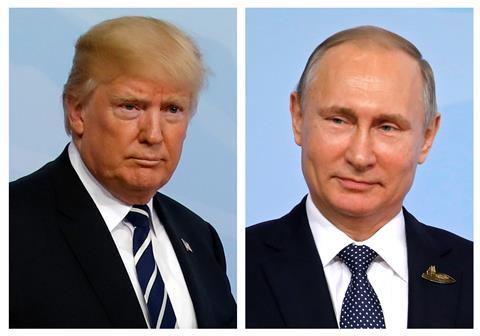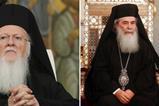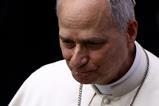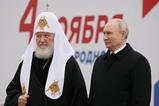If a US-negotiated peace agreement between Russia and Ukraine involves ceding land, it will also have huge implications for the Church. Andreja Bogdanovski explains why Putin wants control of Orthodoxy in Ukraine - and why that would be dangerous for all Christians

Donald Trump promised that, when he became America’s new president, he would end the war within Ukraine in 24 hours. Many in Europe, including Ukraine’s President Zelensky, feared he could not deliver on those promises without twisting Ukraine’s arm and appeasing Putin’s appetite to conquer Ukraine.
As we mark three years since Russia’s brutal invasion, these fears have materialised, making it hard to distinguish between the rhetoric emanating from Moscow and that coming from Washington. Trump’s team launched negotiations with Russia without involving Ukraine, diminishing Zelensky’s ability to negotiate a just peace almost entirely.
Following a prolonged period of isolation, the new US administration welcomed Putin back into global affairs, entering negotiations with a willingness to accept key stipulations from Russia about Ukraine, even before talks began. These included denying Ukraine NATO membership, no return to Ukraine’s pre-2014 borders and the elimination of any American role in peacekeeping efforts.
The current Ukrainian leadership considers the Ukrainian Orthodox Church – Moscow Patriarchate a conduit for spreading Russian propaganda
After the first face-to-face negotiations took place two weeks ago in Saudi Arabia, Trump called Zelensky a dictator, in effect supporting Russia’s demands for regime change in Ukraine. Perhaps the most astonishing assertion so far has been Trump’s claim that it was Ukraine who first instigated the war that has so ravaged their country.
Where does this leave Ukraine?
Whereas the Europeans, including the UK (and the previous US Biden administration) sought to ensure Ukraine’s strongest possible position in negotiations with Russia, Trump’s approach has completely altered this situation.
With the US so far yielding to Putin’s demands, discussions surrounding the Ukrainian Orthodox Church will surely arise, which will result in a major shift in the country’s faith dynamics.
The Kremlin has consistently alleged that Zelensky, with the intention of dismantling Orthodoxy, is persecuting Christians and adherents of the Ukrainian Orthodox Church – Moscow Patriarchate (UOC-MP). It has historically maintained that Ukraine falls within its canonical domain, and it is now striving to bring back earlier Russian control.
Since the first day of the invasion, Putin has insisted on enhanced protection for the Russian language and culture as a key demand of peace negotiations, which also encompasses the future of Ukraine’s Orthodoxy.
What could happen in the religious sphere?
It is realistic to expect that the religious aspect will form a part of the peace negotiations. Ironically, it was during the first US Trump administration that Ukraine was granted an independent church in 2019, something that significantly troubles Putin.
One might foresee two complimentary paths unfolding for the future of Orthodoxy in Ukraine: one process led by the Ukrainian state under pressure from Moscow, followed by a renewed campaign by Russian Patriarch Kirill to regain his foothold in Ukraine’s Orthodoxy.
If Trump’s haste for a quick win succeeds in forcing Ukraine into submission under the pretence of “peace talks”, and Moscow seizes the opportunity to install its own puppet regime in Kyiv, the first thing would be the rehabilitation of the UOC-MP back into the Ukrainian religious mainstream.
As a result, the primary measure would be to remove any current restrictions on the UOC-MP, which has traditionally been under the Russian Orthodox Church. Moscow might demand specific new legislation that would guarantee the rights of its believers and cement its position in Ukrainian society.
With the US so far yielding to Putin’s demands, discussions surrounding the Ukrainian Orthodox Church will surely arise
The current Ukrainian leadership considers the UOC-MP a conduit for spreading Russian propaganda and has gone to lengths to curb this influence. Since the war broke out, it has arrested several dozen priests and hierarchs for helping the aggressor.
Under the leadership of Metropolitan Epifaniy, the independent Orthodox Church of Ukraine (OCU) will find itself vulnerable to the ambitions of subsequent political authorities.
A stronger presence of the UOC-MP in Ukrainian society is likely to hinder the development of the OCU, as the transfer of local parishes may be stalled, and international recognition of its autocephaly is unlikely to move forward.
Moscow will probably insist on the repeal of any legislation permitting the transfer of parishes from the UOC-MP to the OCU, a process which intensified in 2019 after Ukraine was granted an autocephalous church. Metropolitan Epifaniy and the independent OCU face the danger of being pushed to the fringes.
Land battles
Any arrangement made regarding Russia’s claims to Ukraine’s land would also be reflected in the religious domain. In the event that Ukraine is forced to concede Crimea and parts of the Donetsk, Luhansk, Kherson and Zaporizhia regions, Kyiv would also relinquish any religious claims to these areas, giving full control to the Russian Orthodox Church.
The effects of this will ripple through the other denominations. The current Moscow-induced prohibitions against the Ukrainian Greek Catholic Church or Protestant communities in these territories will be officialised, resulting in a substantial curtailment of religious liberties.
We must pray that doesn’t happen, as it would be a disaster for all Ukranian Christians.







































No comments yet